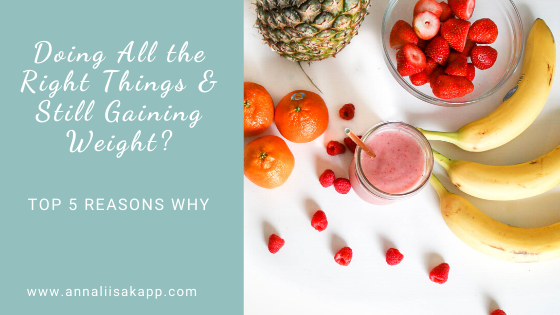
.
You are positive that you’re not eating more food or “junkier” food but you’re still gaining weight.
Is this possible?
Yes! You are NOT crazy!
And here’s why.
We both know that the whole “calories in, calories out” argument is an overly simplistic view of weight.
There’s definitely more to the story than just what you’re eating, right?
A lot of this comes right down to your metabolic rate which is affected by things like your activity level, history of dieting, body composition, and even what you eat.
But, let’s go beyond the “eat less and exercise more” advice and dive into some of the less obvious underlying reasons why you may be gaining weight even though you’re eating the same.
Things like:
- Aging
- Hormones
- Blood sugar imbalance
- Sleep habits
- Stress load
- Toxins
Aging
Funny things happen the older we get. People commonly experience lower energy levels, more digestive discomfort, weight gain, as well as aches and pains.
Aging can result in hormonal changes for both men and women. And these can contribute to loss of some lean muscle mass, as well as increases and changes in fat storage on our bodies.
As we age, we become more insulin resistant, meaning that your intake of certain carbohydrates may have a much bigger impact on your blood sugar levels compared to your younger years. What’s more, as women go through the hormonal changes after menopause, our estrogen levels drop, which further increases our insulin levels because estrogen helps our cells respond better to insulin. This can explain the weight gain around the belly!
And why does our metabolism slow down as we age? Because our muscle mass is like the engine for burning calories. According to the American College of Sports Medicine, we can lose about 10 percent of their muscle by age 50. By the time you reach your 60s and 70s, your muscle strength can decrease by about 15 percent per decade.
The good thing is that, the addition of strength training can slow the metabolic drop associated with loss of muscle mass. We can also adjust the types of carbohydrates we are consuming, drink less wine, and do more to support our adrenals as they take over most of the estrogen making after menopause.
Hormones
Your thyroid is the master controller of your metabolism and can be a massive contributor to your weight gain. There are several things that can affect it and throw it off course.
When your thyroid gets off course and produces fewer hormones your metabolism slows down. And when your metabolism slows down you can gain weight. Even though you’re eating the same way you always have.
Cortisol, the fight or flight hormone released when you’re stressed, exercising, or have low blood sugar, can have an unfavourable effect on our waistline in many ways. First off, it depresses your metabolic rate by interfering with thyroid hormone. Cortisol also depletes your happy hormone, serotonin, causing depression and more carbohydrate cravings. Cortisol can cause blood sugar imbalance, resulting in hypoglycemia and symptoms of shakiness, irritability, fatigue and headaches between meals. It can cause you to eat more than you need to by stimulating appetite-boosting NPY and blocking appetite-suppressing leptin.
What’s more, high cortisol levels in the evening can deplete your natural melatonin rise, preventing you from falling asleep easily and staying asleep throughout the night.
Pro Tip: Talk with your Naturopathic Doctor about having your hormones tested beyond just the TSH that’s tested through your GP.
Blood sugar imbalance
One of the first areas I look at as a nutrition expert, is how well you are balancing your meals throughout the day to keep your blood sugar levels stable throughout the day. Factors like coffee, alcohol, refined grains, eating too little fat , fibre, and protein, and skipping your meals can all fluctuate your blood sugar levels. This is a big issue because it can raise your blood sugar quickly, which releases insulin – the hormone that helps glucose from your blood get into your cells. Too much insulin not only encourages your body to store unused glucose as fat, but also blocks the use of stored fat as an energy source. What’s more, if you continue down this path of high/low blood sugar fluctuation, you can eventually develop insulin resistance, type 2 diabetes, metabolic syndrome, and inflammation in the body.
Pro Tip: Try eating 25-30 grams of protein with your breakfast to start your day off with balanced blood sugar levels. Add a source of healthy fat – like avocado, and some fibre – ex. 1 Tbsp chia seeds.
Sleep
There is plenty of research that shows the influence that sleep has on your metabolic rate.
And as we age it can become harder and harder to get a good night’s sleep.
The general consensus is to get 7-9 hours of sleep every night to help avoid weight gain.
It’s true! Lack of sleep is linked with weight gain.
Who ever thought you can sleep off your weight?
Pro Tip: Try to get at least 7 hours of sleep every night. The first place to start is by implementing a calming before bedtime routine.
Stress
It seems to be everywhere! So many things that can cause stress responses in your body including mental/emotional stress, life/work balance, over exercising, eating foods that you’re sensitive to, environmental toxins, and PTSD. And under chronic stress, our whole system feels the burden. From our gut microbiome, to our thyroid being able to properly convert T4 & T3, and the fluctuations in blood sugar causing increased cortisol and insulin, which can lead to more belly fat.
While you can’t necessarily change some stressors, you can try to adjust your stress response to them by learning more about blood sugar balance, reducing toxins and food allergens, adaptogenic plants, and daily stress management techniques like time management skills, deep breathing, and creating healthy boundaries.
Pro Tip: Try meditation or yoga. Or even mindful eating. What about going to sleep an hour earlier? These are all simple steps you can start with to better manage the stress response.
Conclusion:
There are lots of factors that can affect your weight, even if you’re eating the same way you always have. Aging, hormones, stress, and sleep are all interconnected to each other and can all contribute to weight gain, even if you’re eating the same way you always have.
Recipe (Thyroid friendly iodine): Seaweed Sushi Bowl
Serves 2
1 cup cooked rice
1 avocado (thinly sliced)
½ cucumber (diced)
½ red pepper (thinly sliced)
1 green onion (chopped)
2 tablespoons dried seaweed (arame, wakame, or crumbled nori sheets)
2 tablespoons sesame seeds
3 tablespoons rice vinegar
3 tablespoons gluten-free tamari sauce
1 tablespoon lemon juice
1 tablespoon sesame oil
½ garlic clove
dash salt and pepper
Split the first seven ingredients into two bowls.
Mix the rest of the ingredients together to make the dressing.
Pour the dressing over the sushi bowls.
Serve & Enjoy!
Tip: This is a great lunch to take on the go. Keep dressing in a separate container so you can give it a shake before adding it onto the sushi bowl.
FREE NUTRITION CLASS – 3 SIMPLE STEPS TO LONG TERM WEIGHT LOSS
Do you want to know the BIGGEST mistake I used to make when it came to fat loss and blood sugar balance?
I thought that healthy foods were the same as weight loss foods and blood sugar balancing foods.
If a food was packed full of vitamins and minerals, it obviously had to be good for whatever goals I wanted to achieve…right?
Wellllll…if only it were that simple.
Join me for an upcoming free nutrition class, when I’ll share more on this: https://www.annaliisakapp.com/free-weight-loss-class






